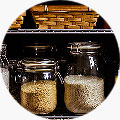Taro is a root vegetable native to Southeast Asia and India, widely cultivated and consumed across various tropical regions of the world. It belongs to the Araceae family and is botanically known as Colocasia esculenta. Taro is valued for its starchy corms, which are used as a staple food in many cuisines. It has a rough, brown exterior and a starchy, white or purple flesh when cooked. Taro can be boiled, steamed, roasted, or mashed, and it is used in a variety of dishes such as soups, stews, curries, and desserts. In addition to its culinary uses, taro is also appreciated for its nutritional value, being a good source of fiber, vitamins, and minerals. However, it's important to note that taro must be cooked thoroughly before consumption, as its raw form contains toxins that can cause discomfort if ingested.
In Turkish cuisine, taro, known as "yer elması" or "gölevez" in Turkish, is primarily used in traditional dishes and desserts. Here are some common ways taro is used in Turkish cuisine:
Stews and Soups: Taro is often added to hearty stews and soups, especially during the winter months. It adds a unique texture and flavor to dishes like "etli güveç" (meat stew) or "köy çorbası" (village soup).
Vegetable Dishes: Taro can be cooked as a standalone vegetable dish or combined with other vegetables such as carrots, potatoes, and eggplants. It is typically boiled, steamed, or sautéed with olive oil and seasonings.
Desserts: In Turkish desserts, taro is commonly used to make "şekerpare," a sweet treat made from balls of dough soaked in syrup. Taro can also be incorporated into traditional Turkish puddings and sweets like "aşure" or "helva."
Pickled Taro: Pickled taro is a popular snack in some regions of Turkiye. The taro is sliced thinly, seasoned with salt, vinegar, and spices, and left to ferment before being served as a tangy appetizer.
Taro is known by various names in different countries and regions around the world. Here are some common names for taro in different languages:
English: Taro
Spanish: Malanga, Ñame
Portuguese: Inhame, Cará
French: Colocase, Dachine
Italian: Malanga, Talas
German: Taro, Echte Taro
Dutch: Taro, Echte Taro
Chinese (Mandarin): Yu Tou (芋头)
Japanese: Satoimo (里芋)
Korean: Toran (토란)
Thai: Pueak (เผือก)
Tagalog: Gabi
Hawaiian: Kalo
Albanian: Taro is referred to as "Patate e bardhë" or "Patate e zi" in Albanian, which translates to "white potato" or "black potato" respectively.
Bosnian/Croatian/Serbian: In these languages, taro is commonly known as "Taro" (Таро), similar to its English name.
Greek: In Greek, taro is known as "Kolokasi" (Κολοκάσι).
Bulgarian: Taro is known as "Taro" (Таро) in Bulgarian, similar to its English and Serbian names.
Arabic: In Arabic, taro is commonly known as "Kolkas" (كلكاس) or "Kilkas" (كيلكاس).
Egyptian Arabic: In Egyptian Arabic, taro is known as "Kolkas" (كلكاس) or "Kilqas" (كلقاس).
Levantine Arabic: In the Levant region, including countries like Lebanon, Syria, Jordan, and Palestine, taro is known as "Kilkas" (كيلكاس) or "Kolkas" (كلكاس).
Maghrebi Arabic: In the Maghreb region, including countries like Morocco, Algeria, Tunisia, and Libya, taro is known as "Kilkas" (كيلكاس) or "Kolkas" (كلكاس).












